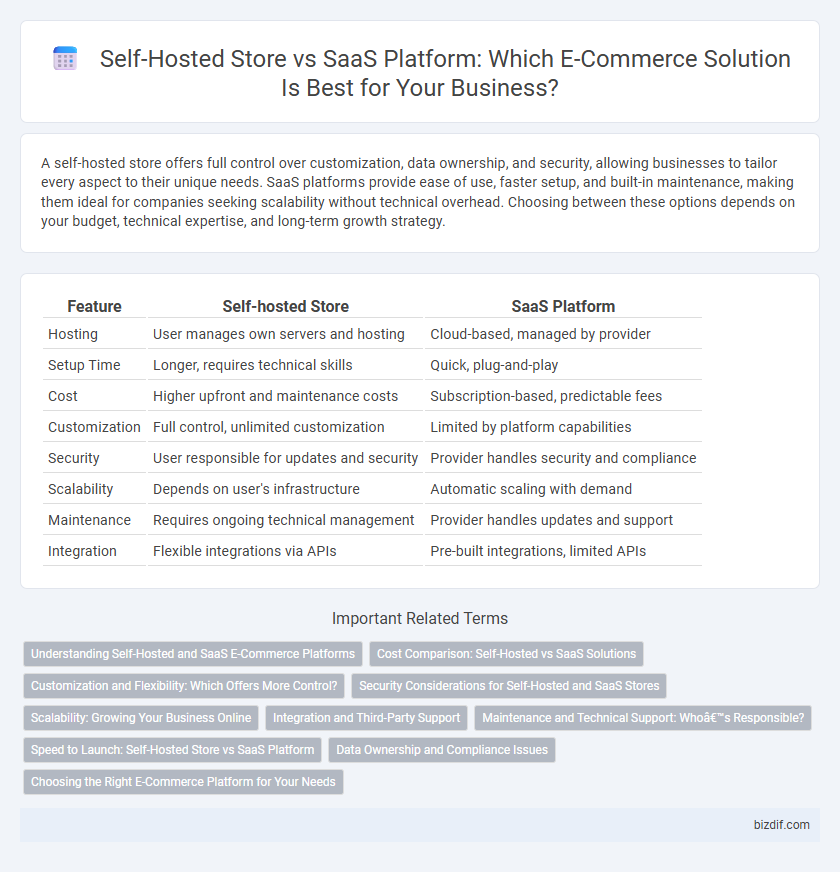A self-hosted store offers full control over customization, data ownership, and security, allowing businesses to tailor every aspect to their unique needs. SaaS platforms provide ease of use, faster setup, and built-in maintenance, making them ideal for companies seeking scalability without technical overhead. Choosing between these options depends on your budget, technical expertise, and long-term growth strategy.
Table of Comparison
| Feature | Self-hosted Store | SaaS Platform |
|---|---|---|
| Hosting | User manages own servers and hosting | Cloud-based, managed by provider |
| Setup Time | Longer, requires technical skills | Quick, plug-and-play |
| Cost | Higher upfront and maintenance costs | Subscription-based, predictable fees |
| Customization | Full control, unlimited customization | Limited by platform capabilities |
| Security | User responsible for updates and security | Provider handles security and compliance |
| Scalability | Depends on user's infrastructure | Automatic scaling with demand |
| Maintenance | Requires ongoing technical management | Provider handles updates and support |
| Integration | Flexible integrations via APIs | Pre-built integrations, limited APIs |
Understanding Self-Hosted and SaaS E-Commerce Platforms
Self-hosted e-commerce platforms require businesses to manage their own web servers, providing full control over customization, security, and data ownership, but often demand technical expertise and ongoing maintenance. SaaS e-commerce platforms offer a cloud-based solution with simplified setup, automatic updates, and integrated hosting, enabling faster deployment and scalability while limiting customization options. Choosing between self-hosted and SaaS platforms depends on factors such as budget, technical resources, desired control, and long-term business goals.
Cost Comparison: Self-Hosted vs SaaS Solutions
Self-hosted e-commerce stores typically involve higher upfront costs including server infrastructure, software licenses, and ongoing maintenance fees, whereas SaaS platforms charge predictable monthly or annual subscription fees with included hosting and updates. While self-hosted solutions offer greater customization and control, hidden expenses like security management and technical support can raise total cost of ownership. SaaS platforms provide scalable pricing models that can be more cost-effective for small to medium-sized businesses seeking hassle-free deployment and lower IT overhead.
Customization and Flexibility: Which Offers More Control?
Self-hosted stores provide unparalleled customization and flexibility, granting full control over code, design, and functionality, ideal for businesses with specific requirements or technical expertise. SaaS platforms offer easier setup and maintenance but limit customization options due to predefined templates and features, which can restrict unique branding and complex integrations. For extensive control and tailored user experiences, self-hosted solutions outperform SaaS platforms in flexibility and customization capabilities.
Security Considerations for Self-Hosted and SaaS Stores
Self-hosted e-commerce stores require extensive security management, including regular software updates, firewall configuration, and data encryption to protect against cyber threats. SaaS platforms provide built-in security measures such as PCI compliance, automatic backups, and DDoS protection, reducing the burden on merchants but limiting customization. Evaluating security needs depends on factors like business size, technical expertise, and regulatory requirements to ensure data integrity and customer trust.
Scalability: Growing Your Business Online
Self-hosted e-commerce stores offer complete control over scalability, allowing businesses to customize server resources and optimize performance as traffic and sales increase. SaaS platforms provide built-in scalability with automatic resource allocation, simplifying the growth process without requiring technical expertise. Choosing between these options depends on the business's need for flexibility versus ease of scaling during rapid online expansion.
Integration and Third-Party Support
Self-hosted stores offer extensive flexibility for custom integrations, allowing businesses to tailor third-party plugins and APIs precisely to their unique workflows. SaaS platforms provide streamlined integration with popular third-party services through built-in connectors and app marketplaces, simplifying setup but sometimes limiting customization scope. Choosing between them depends on the need for deep integration control versus ease of use and maintenance.
Maintenance and Technical Support: Who’s Responsible?
In self-hosted e-commerce stores, the business owner is responsible for all maintenance tasks and technical support, including security updates, server management, and troubleshooting. SaaS platforms provide automatic maintenance, regular updates, and dedicated technical support, alleviating these burdens from the merchant. This transfer of responsibility ensures SaaS users benefit from optimized performance and continuous platform improvements without requiring in-house technical expertise.
Speed to Launch: Self-Hosted Store vs SaaS Platform
SaaS platforms offer significantly faster launch times, often enabling businesses to set up and go live within days due to pre-built templates and integrated hosting solutions. Self-hosted stores require extensive setup, including server configuration, security protocols, and custom development, which can extend the time to launch to several weeks or months. The accelerated deployment of SaaS platforms provides a critical advantage for merchants prioritizing rapid market entry and immediate online sales.
Data Ownership and Compliance Issues
Self-hosted stores grant complete data ownership and control, enabling businesses to tailor compliance measures to specific regulations such as GDPR or CCPA. SaaS platforms often store data on third-party servers, which can complicate compliance and raise concerns over data sovereignty and access rights. Choosing between the two depends on prioritizing full autonomy versus convenience and built-in compliance support.
Choosing the Right E-Commerce Platform for Your Needs
Self-hosted e-commerce stores offer full control over customization, data ownership, and scalability, making them ideal for businesses with technical resources and unique requirements. SaaS platforms provide ease of use, rapid deployment, and built-in security features, suited for small to mid-sized businesses seeking low maintenance and quick setup. Evaluating factors such as budget, technical expertise, customization needs, and long-term scalability is crucial when selecting the right platform.
Self-hosted Store vs SaaS Platform Infographic

 bizdif.com
bizdif.com